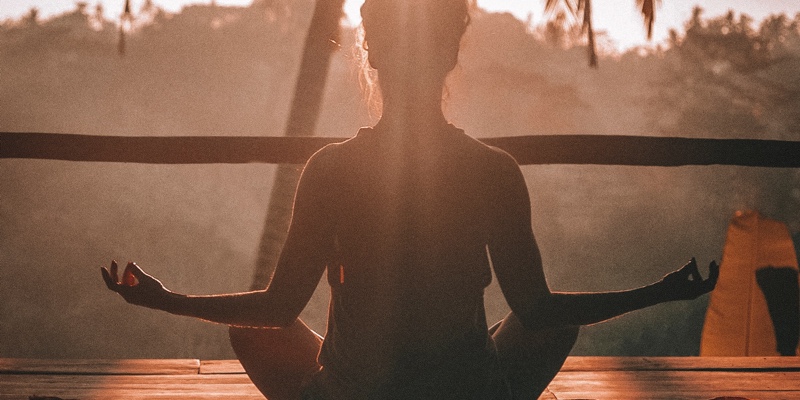What is mindfulness, exactly?
One of the most common questions I get from new clients is whether or not they should “start doing mindfulness.”
Usually they’ve read an article about how mindfulness can help reduce stress or relieve anxiety, or a friend has started meditating and says it will change their life.
But they’re a little uneasy about it, often because any type of meditation sounds just a little too new-agey or “out there.”
And while everyone seems to know about mindfulness, none seems to be able to give a straight answer to the simple question of, yeah, but what is it?
Still, they’re tempted by the idea that this mindfulness thing could somehow become a valuable “coping skill” or the thing that finally helps them turn a corner in whatever particular self-improvement project they’re working on.
What mindfulness is (and what it is not)
There are as many definitions for mindfulness as there are people claiming that it will change your life.
While I don’t consider myself an expert, I have read quite a bit about it and do my own practice regularly. Consequently, I’ve come up with a pretty good working definition:
Mindfulness is the mental habit of paying attention without thinking.
That sounds cryptic. Let’s unpack it a little.
Mindfulness is a mental habit
The first thing to know about mindfulness is that it is mental, which means it has to do with what’s inside your head not what you do physically or your environment.
- You can be just as mindful in your car on your way home from work as you can sitting cross-legged on a peaceful mountain top in Tibet.
- You can be mindful when things are loud and chaotic or quiet and serene.
- You can be mindful when you’re doing deep breathing in a yoga studio or when you’re out of breath on the treadmill.
Mindfulness is also best thought of as a habit—something you can do deliberately but with enough practice can also become relatively automatic, at least in certain situations.
Think of driving a car:
When you first learned how to do it, it took a lot of focus and deliberate practice. And while at times you still need to be very deliberate with your driving, you can also drive to and from the grocery store and carry on a conversation without much effort because the act of driving has become a habit.
Mindfulness is paying attention without thinking
Imagine your power goes out in the evening as you’re watching TV. You suspect that you may need to flip the breakers, which are outside on the back of the house, so you grab a flashlight and head outside.
In order to successfully get the power back on you need to do two relatively distinct things:
- You have to shine your flashlight onto the breaker box so you can see it.
- You need to actually open the breaker box, identify which breaker got tripped, and then flip it.
Put more generally, you have to see before you can do.
This distinction between seeing and doing is analogous to the difference between paying attention and thinking.
Attention is what we choose to focus on or see with our mind. The metaphor that many cognitive scientists use for attention is a spotlight. It’s what selects and maintains the small slice of experience that our minds can potentially take in.
Thinking, on the other hand, is mental work. It’s opening the breaker box, reading the labels, and flipping the right breaker. It includes things like analyzing, comparing, evaluating, imagining, judging, predicting, problem-solving, etc. All these different types of thinking are a kind of mental work that allow us to do and produce things with our minds.
All squares are rectangles but not all rectangles are squares
The crucial point to remember is while all thinking requires attention, attention doesn’t require thinking.
You can walk around outside at night with your flashlight, illuminating various objects and areas without doing anything to them—the flashlight simply allows you to see them.
Similarly, we can use our minds to observe and pay attention to things without mentally doing anything—analyzing, comparing, predicting, etc…
Here’s a practical example: Take out a piece of paper and write down the following:
27 x 15 = ?
Now, set a timer on your phone or note the time on a clock and just look at what your wrote down for 60 seconds. Don’t do multiplication and find the answer, just look at the numbers and symbols.
That’s mindfulness. It’s paying attention without thinking.
Lapsing into thought
Of course, if you’re like me, even in that brief exercise you probably “lapsed” into some thinking.
Maybe you thought to yourself This is dumb or Has it been a minute yet? Or maybe your phone rang and you looked over, saw that it was your great aunt Mildred calling, and decided to let it go to voicemail and at the same time imagined her rebuke for your poor phone etiquette.
In any case, it’s surprisingly hard to just pay attention without some form of thinking hijacking our consciousness.
Because we spend so much of our days thinking in one form or another, our minds freak out a little when we decide to just pay attention. Like a angry toddler, it starts yelling at us with all sorts of shiny, exciting, or maybe scary thoughts.
And it’s really hard not to shift back into thinking mode when this happens.
What’s wrong with thinking mode?
There’s nothing inherently wrong with thinking and nothing inherently right with paying attention. Both can be right or wrong in different situations.
Think of the gears in a car.
It would be silly to say that 5th gear is inherently better than or more right than 2nd gear. If you’re cruising down a lonely highway at 70 mph on a beautiful summer day, 5th gear is great!
But if you’re driving from the grocery store to the post office through a school zone on a Tuesday afternoon during a snowstorm, 5th gear is probably not such a great idea—2nd or 1st might be better.
Just like no gear in a car is inherently better or worse than any other, the two primary gears of the mind—paying attention and thinking—are not better or worse than each other.
Instead, one may be more or less helpful than the other depending on the situation.
How is attention without thinking helpful?
To stick with the car analogy, while it’s fun to go fast, driving in 5th gear at high speeds burns through gas faster and makes it harder to react safely if something unexpected happens.
On the other hand, driving at slower speeds doesn’t take as much fuel and makes it easier to adapt to new circumstances on the road—although, admittedly, it’s often less fun.
In other words, while thinking is an impressive, powerful, and even fun mental gear, it has its costs in terms of energy depletion and flexibility.
The first one is fairly obvious, if we spend all of our time in mental high gear, it gets exhausting. When we’re constantly planning, analyzing, comparing, weighing costs and benefits, and on guard for potential problems, and the like, we can become chronically stressed or anxious.
How would you feel if you were driving through a small residential neighborhood but could only drive at 70 mph in 5th gear? It’d be pretty terrifying and exhausting!
And by keeping ourselves constantly in thinking mode 24/7, we’re often keeping ourselves more stressed and anxious than we need to be.
The second reason attention without thinking is helpful is that not being able to shift out of thinking mode also makes us less flexible and adaptable.
While 95% of the time our mental ability to problem-solve is a good thing, what if you’re trying to problem-solve something that can’t be solved?
This is the situation we find ourselves in when we’re chronically anxious.
Even though we know intellectually that there’s nothing really dangerous present or that there’s nothing we can do about something that’s worrisome, we continue to act mentally as if there is. We worry, obsess, ruminate, and keep thinking.
I wrote about this process in detail here: Why We Worry (And How to Stop)
In other words, worry—and the anxiety that it produces—is a direct result of not being able to downshift out of thinking mode and into just paying attention mode.
When we’re fixated on flipping the breaker even though we’ve done it 10 times and nothing’s improved, we can’t get ourselves unstuck. We can’t let it go or shift our attention to something more productive.
In short, developing the habit of paying attention without thinking helps us to decrease overall stress and be more mentally flexible.
Mindfulness vs Mindfulness Meditation
Just like it would be nice if anyone could sit down at a piano and start playing Beethoven, it would be nice if—having understood the importance of mindfulness—we could just be more mindful throughout our lives.
But of course, neither mindfulness or playing the piano work that way.
Both take practice. And just like becoming an accomplished and fluent piano player requires practicing scales and learning to read music, becoming more mindful takes some deliberate practice as well.
Enter Mindfulness Meditation.
Mindfulness Meditation is simply a formal practice for learning how to pay attention without thinking. While it was originally formulated as a part of various Eastern religious and spiritual practices, most modern forms of Mindfulness Meditation don’t have any spiritual component. They’re simply attention training exercises.
Arguably the most basic Mindfulness Meditation exercise involves paying attention to your breath. That’s it.
Seriously, you just sit down (or stand up, it doesn’t matter) and pay attention to how it feels to breathe without thinking about anything else.
And when you do inevitably get distracted and pulled into thinking mode, you calmly re-direct your attention back to how it feels to breathe. Many people set a timer for 10 or 20 minutes or some other time interval, but you don’t have to.
If you want a slightly more in-depth guide about how to get started with a formal mindfulness practice, I write about it here: How to Start a Mindfulness Practice: A Quick Guide for Complete Beginners
That’s really it. Like a lot of physical exercises, most people fall into the trap of making things more complicated than they need to be—fancy shoes, the perfect gym, kettle bells vs dumbbells, etc.
When it comes to Mindfulness Meditation, you don’t need to go to a fancy class or buy a mat to sit on and weird incense to burn. You just practice paying attention without thinking.
Like exercise, the idea is simple but putting it into practice is harder. Which is why many people like to join classes, hire a coach or instructor, or download a friendly app to help them get started and stay motivated.
Will mindfulness change my life?
Absolutely.
If you practiced Mindfulness Meditation everyday and committed yourself to living more mindfully throughout your days, I have little doubt that it would be profoundly transformative.
You’d probably be more relaxed, thoughtful, emotionally balanced, and compassionate. You’d worry less, feel less stressed, be more resilient to depression, and probably lower your blood pressure a few ticks. You might even improve your immune system.
But here’s the thing:
There are lots of things that would change our lives for the better that we know about and aren’t great about putting into practice.
Who among us wouldn’t have a better life if we consistently:
- exercised every day
- only ate healthy foods in moderation
- made enough time for sleep
- exercised kindness and compassion in all of our interactions with other people
- read a book a week instead of watching Netflix
- communicated assertively
- wrote a gratitude journal every morning
- volunteered more often to help those in need
- saved more instead of buying stuff we don’t need
I think the better question is, why is it hard for us to do what we already know we should do, whether that’s eating healthily, being kind, or practice mindfulness?
Mindfulness is full of benefits and conceptually not that difficult to wrap our head around.
But like most hard things, understanding is the easy part; it’s the practice that gets us.





15 Comments
Add YoursBreathe in, breathe out
Develop an attitude of gratitude
Live in the pp ( perfect present )
Yesterday’s history
Tomorrow’s a mystery
Today is a gift
That’s why we call it the present
Open your gift
It’s yours to enjoy or destroy
It’s all in the way we look at it.
Is your glass half empty or half full?
Two men looked out from prison bars
One saw mud, the other saw stars
❤️
Love it!
Hello, my understanding is that “purposeful” thinking depletes same pool of energy as mindfulness does. Hence difficulty in practicing it. On contrary mind wandering does not – being part of dmn (default mode network).
Hmmm… Not sure. I know that much of the ego-depletion research has failed to replicate, making me a bit skeptical of the limited fuel metaphor for mental energy.
I’m not sure either 🙂 that’s why at my school we will be trying to replicate Baumeister’s experiment with mindfulness as a mediating factor when resisting temptations. Will see what comes out…
Very cool!
I understand it is an old post. I am anxious to know, the result . Thanks, Vipin
Interesting article. Now I understand why walking or physical workout is relaxing because you do it without thinking. Engrossing in religious ritual (prayers) or hobby (cooking/painting) also cause mindfulness.
Will read more on the subject.
I love all your articles it really goes deep into core and gives me such great inspiration and understanding.
I have a question. I was usually told to write a gratitude journal every evenin before bed.
Does it make a difference writing at morning or evening?
My guess is that it doesn’t matter very much. We tend to have more energy and therefore willpower in the mornings which might make it easier to stick to the habit (but everyone is different). I’m no expert and I have trouble just doing it 2 days in a row, so whenever it’s easiest for you as an individual to keep it up as a regular practice would be my answer.
Doing it in the morning is probably a good way to start the day positively, but also doing it in the evening may contribute to better quality sleep due to it’s impact on one’s state of mind.
Love your posts. Just an FYI, Beethoven is spelled wrong. Just something about spelling and grammar that hits a nerve when I am reading.
I love how you put it nick! Do you think we can practice mindfulness while doing daily house chorus?
Nick, I can’t stop reading all your posts, they are so clear and practical, I keep nodding while I read. Thanks and congrats.
I learned that you can get stressed out over the littlest things like over family issues, relationship issues, and every day things. Also you can get overwhelmed without even realizing it.
being around my family can get frusrating an i have learned to just breathe it really does help alot.